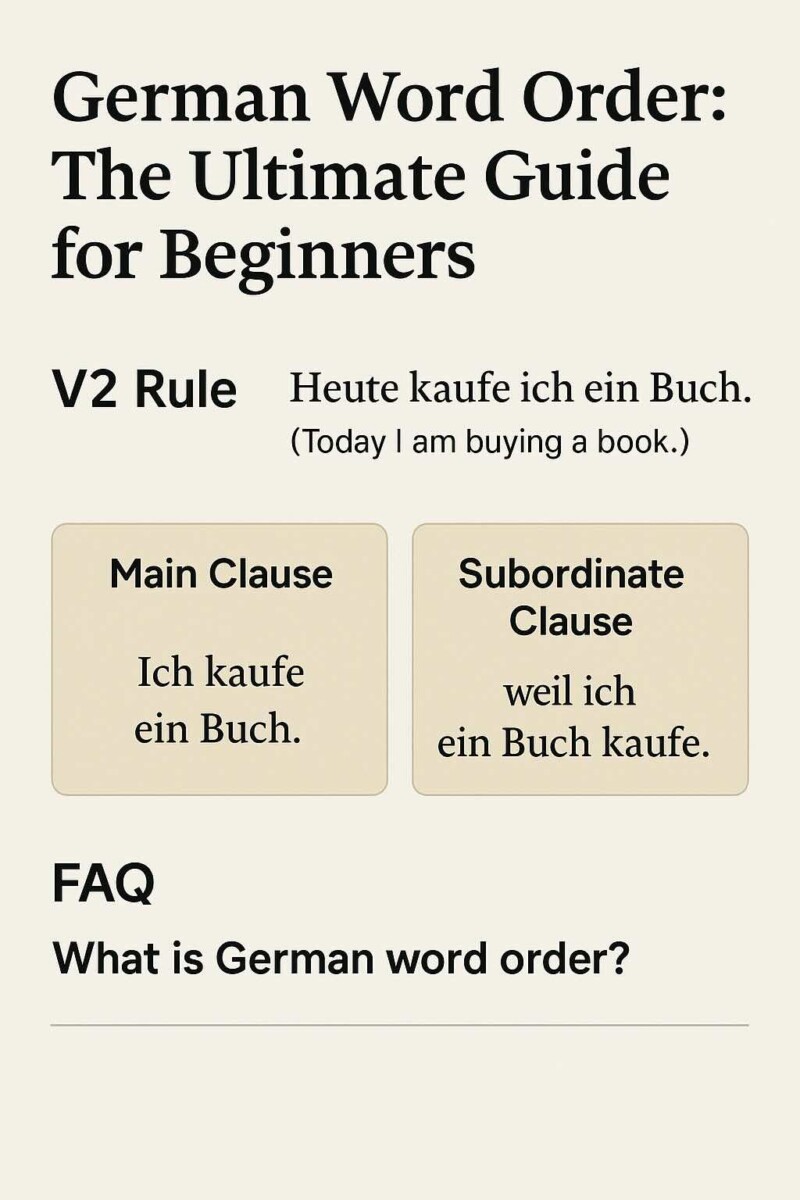One of the first challenges for German learners is orden de las palabras. At first, it seems complicated — but German word order follows clear rules. Once you understand the patterns, you can build correct sentences with confidence.
The Basic Rule: Verb in Second Position (V2)
In a main clause (Hauptsatz)El conjugated verb is always in the second position.
This does not mean the second word — but the second element.
Ejemplos:
- Ich lerne Deutsch. (I learn German.)
- Heute lerne ich Deutsch. (Today I learn German.)
- In Berlin wohnen viele Studenten. (In Berlin live many students.)
Word Order in Main Clauses (Hauptsatz)
The standard structure is:
Subject – Verb – Other elements
| Position | Example | Translation |
|---|---|---|
| 1 | Ich | I |
| 2 | lerne | learn |
| 3 | Deutsch | Alemán |
But any element can stand first — the verb remains second.
Word Order in Subordinate Clauses (Nebensatz)
In a subordinate clause, the verb goes to the end.
Ejemplos:
- Ich weiß, dass du Deutsch lernst. (I know that you learn German.)
- Er sagt, dass er heute arbeitet. (He says that he works today.)
Connector (dass, weil, wenn) → subject → objects → verb at the end.
Word Order in Yes/No Questions
In yes/no questions, the verb comes first.
Ejemplos:
- Lernst du Deutsch? (Are you learning German?)
- Hast du Zeit? (Do you have time?)
Word Order in W-Questions
In W-questions, the question word comes first, the verb second.
Ejemplos:
- Wo wohnst du? (Where do you live?)
- Wann kommst du? (When are you coming?)
Common Mistakes — and How to Fix Them
- ❌ Ich Deutsch lerne.
✔️ Ich lerne Deutsch. - ❌ Ich weiß, dass du lernst Deutsch.
✔️ Ich weiß, dass du Deutsch lernst. - ❌ Heute ich lerne Deutsch.
✔️ Heute lerne ich Deutsch.
FAQ: German Word Order
Q: Is word order strict in German?
Yes — the verb must always be in position 2 in main clauses and at the end in subordinate clauses.
Q: Can I put time first in a sentence?
Yes, any element can go first — the verb stays in position 2.
Q: Is German word order the same as English?
Sometimes, but not always. English word order is stricter with subject-verb-object. German allows more flexibility, but verbs have fixed positions.
Final Note
Word order in German may look difficult at first, but the rules are logical and consistent. Once you learn the V2 rule and the subordinate clause structure, you will feel much more confident.
👉 For a deeper look at how word order connects to German thinking, see Tymur Levitin’s Author’s Column.

📚 Related Articles
- Perfekt vs. Präteritum: What’s the Real Difference?
- Schon vs. Bereits: Why One Word Feels Warmer and the Other Colder
👨🏫 Autor: Tymur Levitin — founder, director, and senior teacher at Levitin Language School | Start Language School by Tymur Levitin.
View teacher’s profile →
🌍 Learn German with us:
German Language Learning Page →
© Tymur Levitin | Category: German Grammar for Beginners






















